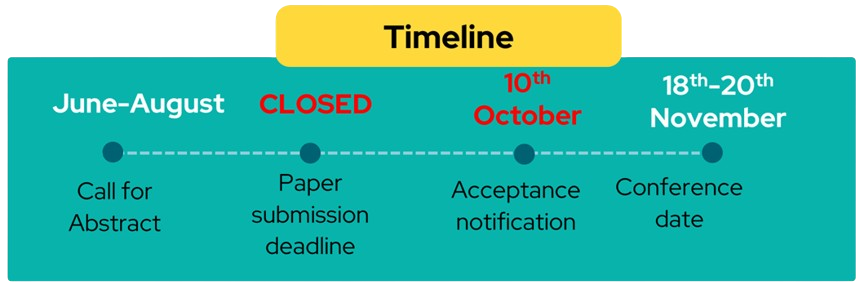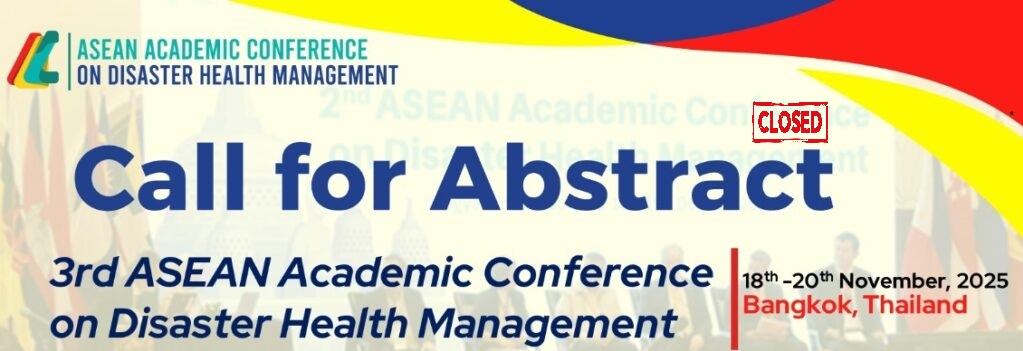Call for Abstracts
The 3rd ASEAN Academic Conference on Disaster Health Management
Building the Disaster Health Management for a Resilient ASEAN
18 – 20 November 2025
Bangkok, Thailand
We are delighted to invite researchers, practitioners, and professionals in the field of Disaster Health Management (DHM) to submit abstracts for the 3rd ASEAN Academic Conference on Disaster Health Management. This conference aims to:
- Provide a platform for academics, practitioners, and policymakers to share research findings, innovative practices, and case studies on DHM;
- Engage policymakers in discussions on effective policies and frameworks for DHM, and to provide recommendations for policy development and implementation;
- Review and reflect on the achievements and impact on the capacity development on DHM, and to discuss the future direction of DHM initiatives in the ASEAN region.
- Foster stronger collaborations and build networks among ASEAN countries, including government agencies, academic institutions, non-governmental organizations, and other stakeholders involved in DHM.
[Announcement]: Abstract selection Result
The 3rd AAC Secretariat is pleased to announce that the abstract selection process is COMPLETED. The authors who have submitted their abstracts will be informed of the selection results and guidelines for the next steps through email communication. Please check your inbox and confirm your participation to save your seats.
Note: Should the authors who submitted an abstract not have received any email notification from the Secretariat of the 3rd AAC on DHM, please contact us through 3aacdhm@niems.go.th to confirm the status of your abstract.

Submission Guidelines for Participants
Please read this guideline before submitting your abstract. The 3rd AAC on DHM abstracts must be submitted through the designated email: 3aacdhm@niems.go.th.
1. Call for abstract
Submission deadline: CLOSED
Abstract submission will be accepted from:
- Authors affiliated with the ASEAN Academic Network on DHM (AANDHM) member institutes/organizations.
- Recommended authors from the AANDHM member institutes/organizations.
- None of above (public).
2. Announcement of Results
3. Conference Date
4. Abstract submission categories
Authors are required to select one of the following 12 categories that best aligns with the topic of their abstract:
- Public Health in on Disaster Health Management: To identify potential activities on public health which should be tackled in DHM through sharing any public health issues including emerging diseases outbreak/pandemics (PHE), shelter management and infection control during disaster response, cases of appropriate actual practices of public health conducted during disaster responses and applicable knowledge/experiences of DHM to the PHE.
- Human Resource Development in Disaster Health Management: To share the experiences for the education/training/exercise development on DHM and to identify problems and challenges as well as to discuss necessary strategies for the improvement and introduction of education curriculum/ training on DHM.
- Regional Collaboration Mechanism for Disaster Health Management: To discuss the challenges for regional collaboration on DHM and perspectives to be considered for further development of a regional mechanism.
- Multidisciplinary/Interprofessional Work (IPW) in Disaster Health Management: To share the perceptions of the effectiveness and impact of multidisciplinary/ IPW and collaborative healthcare teamwork in DHM.
- Policy development for Disaster Health Management: To discuss on the progress or/and challenges on policy development and implications for enhancement of DHM capacity and disaster risk management framework and preparedness, including the country effort to achieve the POA-ALD on DHM such as SOP development for in-country coordination for the disaster response, EMTCC establishment and so on.
- Health Care Workers’ Safety and Well-Being in Disaster Health Management: To exchange the insights regarding a health management and welfare for the health workforce in DHM including human resource management in disaster response, critical incident stress management and PTSD, burnout syndrome, stress release and trauma care for the workforce, effect of briefing and debriefing session, and any issues arise.
- Psychosocial and Psychological Support in Disaster Health Management: To discuss improving the psychosocial and psychological support in DHM through practices and experiences, including the psychological first aid, immediate and long-term interventions support, mental health, and any issues arise.
- Data Management in Disaster Health Management: To discuss the data Management and reporting in DHM in the region, in-country development or implication of disaster data management tools and techniques, utilization of a data to the decision-making during the actual disaster response/recovery, and any issue arise.
- Mass Casualty Incident (MCI) and Prehospital Management: To share the insights to manage a prehospital care and emergency medical service including MCI and mass gathering, implications of prehospital care and EMS system in disaster, first-responder education and training, and so on.
- Safe and Resilient Health Facilities and Infrastructure: To discuss the experiences and practices on safe health facilities project or strategies in ASEAN Member States, challenges to adapt the tools for assessing health facilities safety and develop the resilient health facilities and infrastructure.
- Logistics and Supply Chain Management: To share the insights regarding the importance of logistics and supply management in disaster response and preparedness, stockpile management, effective distributions of relief supplies, and logistics for the team operations in disaster responses.
- Disaster Risk Reduction (DRR) and Climate Change Adaptation (CCA): To integrate DRR and CCA strategies is crucial for building resilient communities. This session will explore the synergies between DRR and CCA, focusing on how these approaches can be effectively combined to enhance overall resilience and sustainability in the ASEAN region.
5. Abstract submission types
The types of the abstract submission are following categories:
- Original Research
- Research Review (including Systematic Reviews, Meta-Analyses, Scoping Reviews, Narrative Review),
- Case Study
- Field Reports/Project Report, and
6. Abstract format
All authors must submit the abstracts by using the official submission form provided in this guideline. If your abstract is being recommended by the AANDHM member institute/organization, the recommendation statement must be completed and included in the submission form. Instructions for Abstract Submission:
- Word limit: Abstracts must not exceed 300 words (excluding the title, authors, and affiliations) in English language.
- File format: abstract file must be submitted in Microsoft Word format (.doc or .docx) using Time New Roman font.
- Structure: The abstract should be structured with the following components:
- Introduction (including objective)
- Method
- Result
- Conclusion and recommendation
However, the abstracts submitted as Field Reports and Case Reports will be summaries including introduction and conclusion.
- Keyword: Provide 3-5 keywords that best represent the content of the abstract.
Additional Requirement:
- Abstract should not contain any figures or tables.
- A corresponding author must be designated with a valid email address. The corresponding author will also serve as the presenter at the conference. The corresponding author does not need to be the first author.
- All submitted abstracts must be original and unpublished. Any abstracts that violate copyright laws or contain plagiarized content will be rejected.
- The abstract previously submitted and accepted at another conference are considered eligible for submission. However, the final decision on acceptance will be made by the Scientific Committee of the conference.
7. Presentation format Options
Authors are required to select a preferred presentation format for submitting the abstracts. Please note that detailed instructions for preparing presentation materials such as a slide format of oral presentation and size of poster presentation will be provided after the selection process is completed by the committee.
- Oral presentation: Oral Presentation format will be approximately 10 minutes long, followed by a question and answer session. PowerPoint slide presentations are expected to display the research and findings.
- Poster presentation: Presenters will display a printed poster in the exhibition space. A dedicated poster session will be held each day of the conference that presenters will be able to present the posters, answer questions, and engage with delegates.
8. Ethical Clearance
9. Selection criteria
All submitted abstracts will be reviewed and evaluated by the Scientific Committee with the following criteria.
- Completeness: Evaluate whole abstract structure and contents
- Quality of Research: Evaluate relevancy with the topics, contribution to practical and problem solving, ethical consideration, English proficiency and so on.
We look forward to your valuable contributions and innovative insights that will help shape the future of disaster health management in the ASEAN region.
The Abstract Submission Form can be downloaded via the following link:

